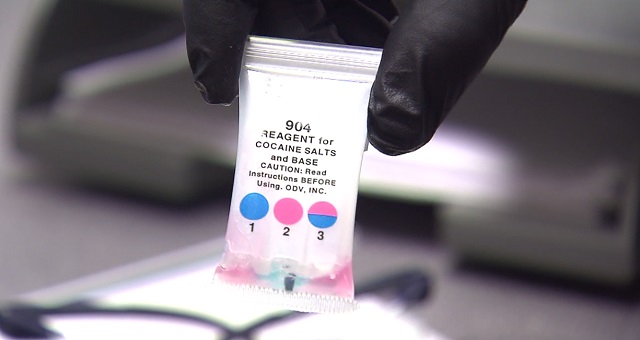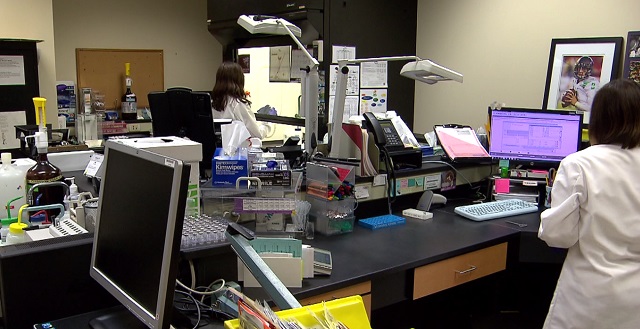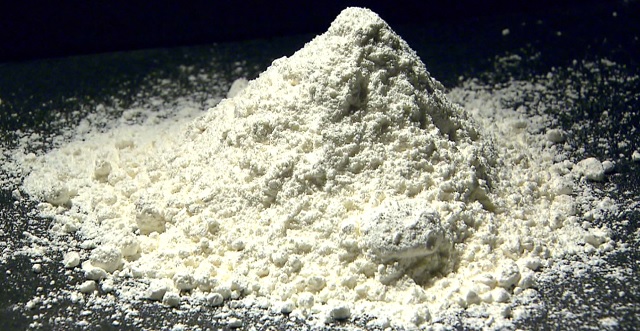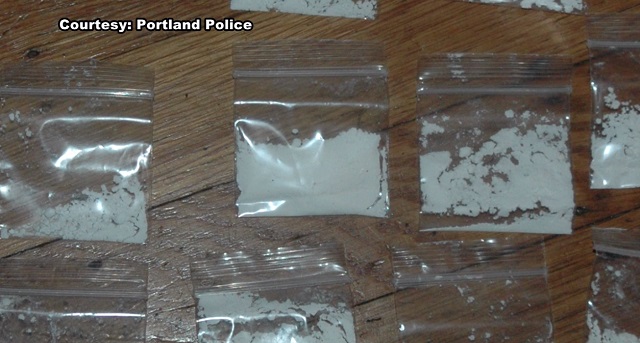PORTLAND, Ore. (KOIN) – Oregon State Police, along with several other local law enforcement agencies, have decided to stop testing suspected narcotics in the field because of fentanyl exposure concerns.
Fentanyl is a synthetic opioid, often described as a high powered morphine. Fentanyl has been in use medically for years, but only in very small dosages.

Sgt. Chris Kenagy, a supervisor with the Portland Police Bureau’s Drugs and Vice Division, said investigators have seen a significant increase over the last 5 to 7 years in the illicit market for fentanyl.
“It’s gained in popularity because it’s so cheap and it’s so powerful,” Kenagy told KOIN 6 News.
He said PPB will continue to test suspected narcotics in the field. Officers have received hours of training on best practices when handling drugs in the field, he added.
Using funds obtained through a federal grant, PPB recently purchased a $26,500 device called “TruNarc” that can identify suspect drugs, eliminating officers from having to take a physical sample.
For years, police have used a product called “NIK” when identifying suspected drugs. When using the NIK test, officers would have to take a small sample, place it inside a small patch. The kit would change color if a drug comes back as a presumptive positive.

Even the smallest amounts of fentanyl can lead to an overdose and potentially death, according to Kenagy.
“Because it’s a fine powder, if you get that powder in the air or on your skin at all, it’s an immediate absorption and it’s a heavy dose of an opioid,” Kenagy said. “So for a normal person who has no opioids in their system and has no tolerance, they’re going to overdose rather quickly.”
The Oregon State Police
OSP Sgt. Yvette Shephard told KOIN 6 News her agency is particularly concerned that troopers would become exposed to fentanyl in rural parts of Oregon and not have access to immediate first aid or backup from other troopers.
“The risk is too far great,” Shephard said. “It’s easier for us to just seize the substance, bring it back to our offices and package it up and then send it to the crime lab where they have the safety procedures.”

The Oregon State Police Crime Lab is proving critical for law enforcement when it comes to identifying drugs.
“Fentanyl is not something you can just look at go ‘Oh yeah, that’s fentanyl,’” said Jon Dyer, the Forensic Supervisor for the Oregon State Police Crime Lab. “Part of our job is to recognize that what we’re looking at may not be what we think it is.”
Dyer said the crime lab has the ability to control their environment, something officers in the field do not have when testing suspected drugs.
The crime lab has equipment that can prevent powder from being spilled out into the open air. Technicians also have access to full protective outfits and can seal off their work environment.
Shephard doesn’t expect prosecutions of user-amount drug possession to decline as a result of OSP’s decision to stop in field drug testing. She said troopers will likely issue a citation to the person and wait for the crime lab results to come back.
Kenagy said it would benefit officers to have one “TruNarc” at each of the bureau’s 3 main precincts, but finding remains an issue.
“You can set the unit up against the packaging and it will give you a reading of what that substance is inside of it so you never, ever have break the packaging to touch the substance,” Kenagy said of the ability of the “TruNarc.”
Law enforcement in Oregon are now in the process of working with the courts to get “TruNarc” accepted as an acceptable presumptive test.
The testing process
Kenagy showed KOIN 6 News the process officers go through when handling suspected fentanyl. It can be found in the form of powder, liquid, pill or patch form. It is most often found in a powdered form.

Officers are told to wear gloves, eye protection, and N-95 face masks. They are given a sealable bucket that is labeled for fentanyl and work with a partner with processing the potential drug scene. Inside the bucket, officers are told to use kitty litter to fill half the bucket. They then place the suspect drug package into an evidence bag, hit seal it and then place that bag into the bucket and seal it. The bucket is then transported to the property room.

Kenagy said fentanyl is imported from China. Illicit purchases are made using the “Dark Net.” Payment is often made using cryptocurrency, such as Bitcoin.
KOIN 6 News reached out to multiple law enforcement agencies about their policies on testing drugs in the field.
Tualatin Police: The Washington County DA’s Office will support officers’ decisions on whether to conduct a field test or not. We recommend our officers base their decision on safety and circumstance.
Vancouver Police: We have not discontinued testing, however we have advised our staff that they should not field test narcotics containing suspected Fentanyl, rather, such items should be submitted to the Washington State Patrol Crime Laboratory for examination.
Multnomah County Sheriff’s Office: No longer doing drug testing in the field.
Salem Police: We are still doing field testing, but we have added more robust protective equipment for the officers in each patrol vehicle. We’ve also done training bulletins on the use of the gear and further safety procedures.
Marion County Sheriff’s Office: Our policy is currently under review. We are collaborating with our criminal justice partners on best solutions.
Clark County Sheriff’s Office: No longer testing suspected fentanyl in the field.
Beaverton Police: No changes, still using NIK testing protocols
Washington County Sheriff’s Office: We are currently being trained concerning the proper personal protective equipment with field testing drugs. We stopped field testing drugs after the fentanyl safety issue arose. We will begin field testing as soon as we are all trained in the proper procedures.
